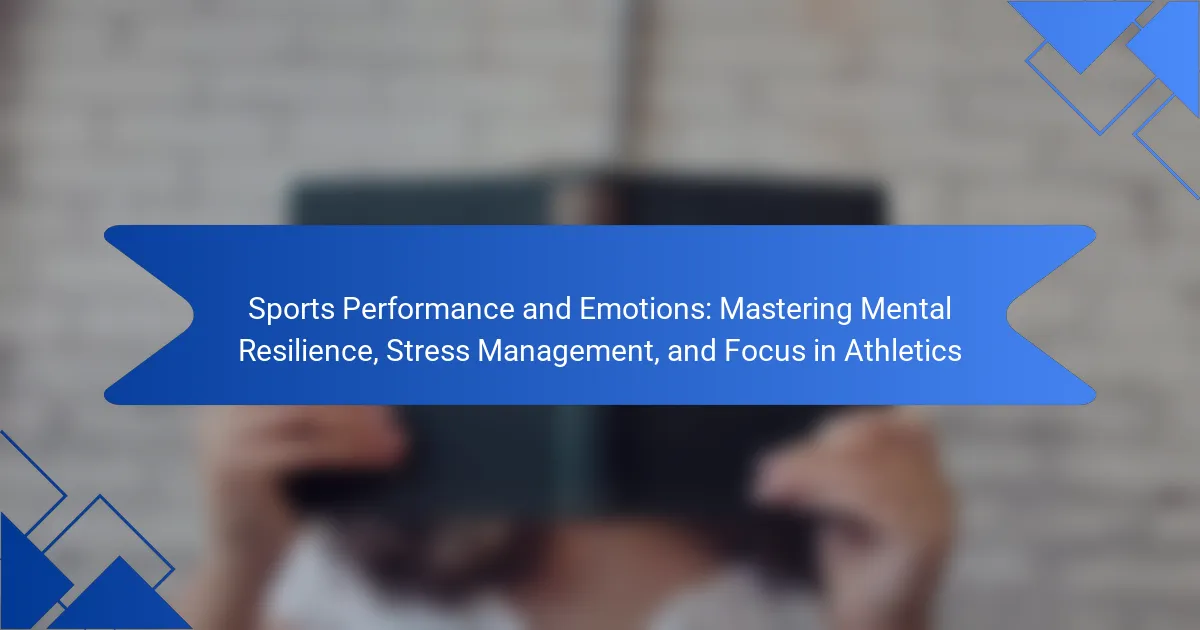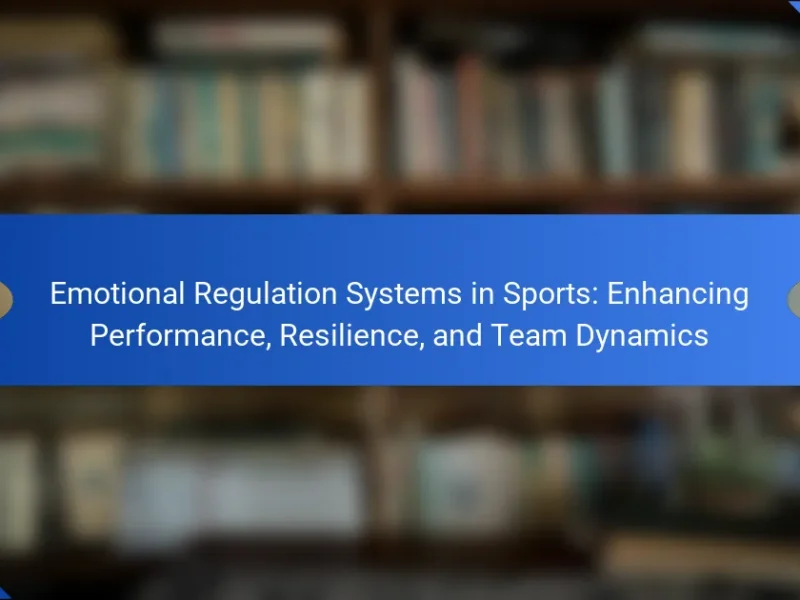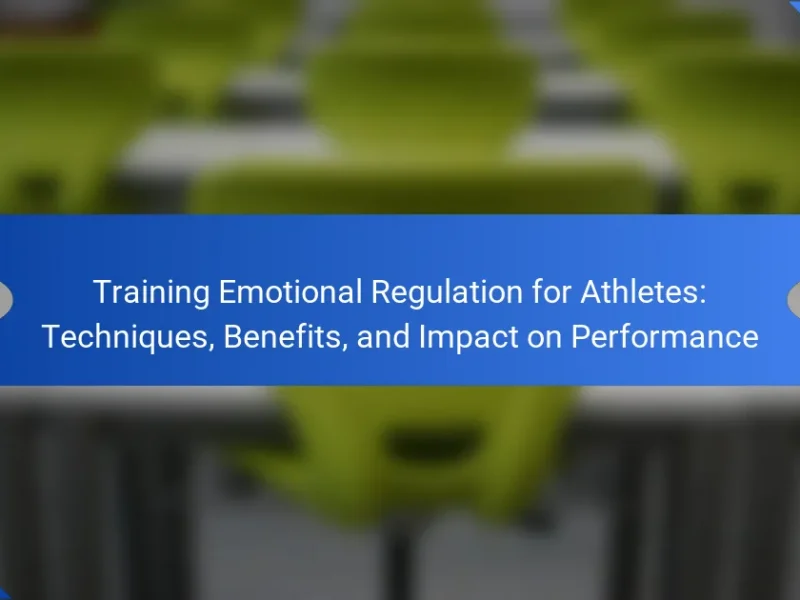Emotional regulation is crucial for athletes aiming to enhance their performance. Mastering mental resilience improves focus and stress management. Effective emotional strategies can lead to better decision-making and teamwork. Understanding unique attributes like psychological resilience and social support systems further aids in achieving peak athletic performance.
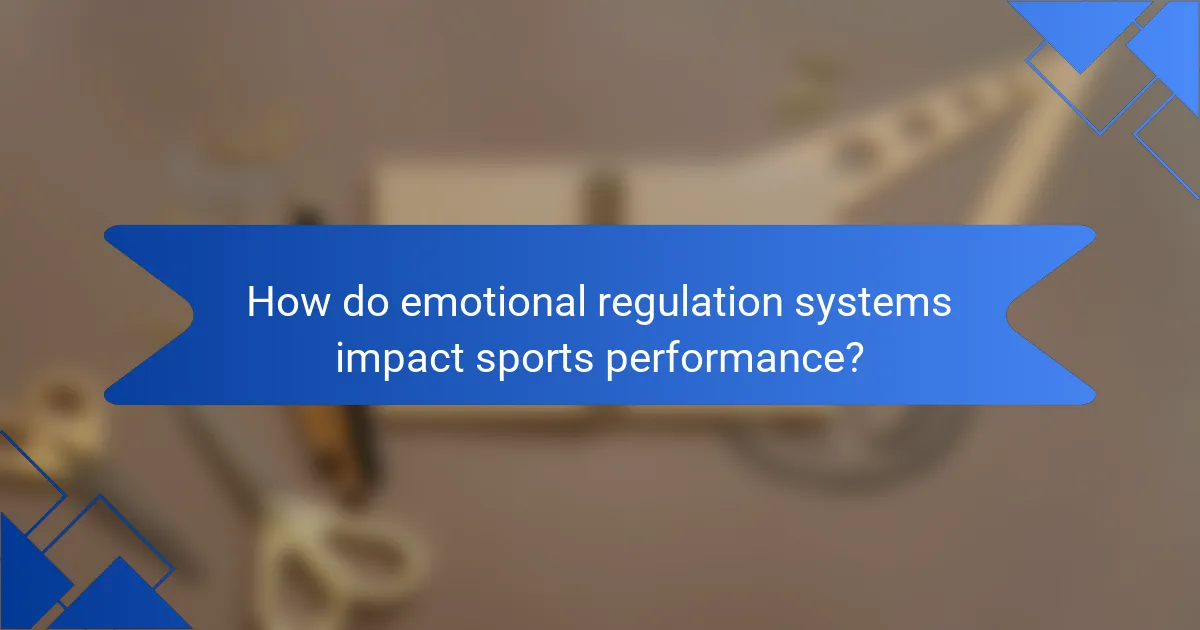
How do emotional regulation systems impact sports performance?
Emotional regulation systems significantly enhance sports performance by improving mental resilience, stress management, and focus. Athletes who effectively manage their emotions can maintain optimal performance under pressure.
Research indicates that emotional regulation directly influences physiological responses, impacting endurance and recovery. For instance, athletes utilizing mindfulness techniques show lower cortisol levels, leading to better performance outcomes.
Moreover, emotional intelligence plays a crucial role in team dynamics. Athletes with high emotional awareness can communicate effectively, fostering collaboration and trust. This synergy can result in improved overall team performance during competitions.
In summary, mastering emotional regulation is essential for athletes seeking to achieve peak performance, as it directly affects their ability to cope with stress and maintain focus.
What are the key components of emotional regulation in athletics?
Emotional regulation in athletics involves managing emotions to enhance sports performance. Key components include self-awareness, cognitive appraisal, emotional expression, and coping strategies.
Self-awareness allows athletes to recognize their emotional states, which is crucial for effective regulation. Cognitive appraisal involves interpreting situations to manage stress and anxiety. Emotional expression helps athletes communicate their feelings, fostering team dynamics. Coping strategies, such as mindfulness and visualization, provide tools to handle pressure.
These components work together to build mental resilience, vital for peak performance in competitive environments. Effective emotional regulation can lead to improved focus, better decision-making, and enhanced overall performance.
How does mental resilience contribute to athletic success?
Mental resilience significantly enhances athletic success by enabling athletes to manage stress, maintain focus, and recover from setbacks. This psychological strength allows athletes to perform under pressure, adapt to challenges, and persist through adversity. Research indicates that mentally resilient athletes often experience improved performance metrics, such as faster recovery times and better decision-making during competitions. Furthermore, mental resilience fosters a positive mindset, which correlates with higher levels of motivation and goal achievement. Developing this attribute can be crucial for athletes aiming to reach their peak performance consistently.
What techniques enhance mental resilience in athletes?
Techniques that enhance mental resilience in athletes include visualization, mindfulness, and goal setting. Visualization helps athletes mentally rehearse performance, improving confidence and focus. Mindfulness practices, such as meditation, reduce stress and enhance emotional regulation. Goal setting provides clear direction and motivation, fostering a growth mindset. These techniques collectively build resilience, enabling athletes to cope with challenges effectively.
What role does stress management play in athletic performance?
Stress management is crucial for enhancing athletic performance as it directly influences mental resilience and focus. Effective stress management techniques, such as mindfulness and breathing exercises, can lead to improved concentration during competitions. Athletes who manage stress effectively demonstrate better decision-making and adaptability under pressure. Research indicates that athletes with strong stress management skills often experience reduced anxiety levels, leading to higher performance outcomes. Therefore, mastering stress management is essential for athletes aiming to optimize their competitive edge.
What are effective stress management strategies for athletes?
Effective stress management strategies for athletes include mindfulness techniques, structured routines, and physical conditioning. Mindfulness practices, such as meditation and breathing exercises, enhance focus and emotional control. Establishing a structured training routine provides predictability, reducing anxiety. Additionally, physical conditioning improves resilience, allowing athletes to handle stress better. Regular feedback and communication with coaches can further support emotional well-being.
How can focus be improved for optimal performance?
Improving focus for optimal sports performance involves techniques like mindfulness, goal-setting, and visualization. Mindfulness helps athletes stay present, while specific goals provide direction. Visualization enhances mental rehearsal, allowing athletes to mentally practice their performance. Regular practice of these techniques fosters mental resilience, reducing stress and enhancing concentration.
What methods help athletes maintain focus during competition?
Athletes can maintain focus during competition through techniques like visualization, mindfulness, and breathing exercises. These methods enhance mental resilience and reduce stress, allowing athletes to concentrate on performance. Visualization involves imagining successful outcomes, while mindfulness helps athletes stay present. Breathing exercises regulate anxiety and improve focus.

What are the universal benefits of emotional regulation in sports?
Emotional regulation enhances sports performance by improving focus, resilience, and stress management. Athletes who master emotional regulation experience reduced anxiety and increased confidence, leading to optimal performance. This skill fosters better decision-making and enhances teamwork, ultimately contributing to success in competitive environments. Studies show that athletes with strong emotional regulation can maintain composure under pressure, allowing for consistent execution of skills.
How does emotional stability enhance teamwork and collaboration?
Emotional stability significantly enhances teamwork and collaboration by fostering trust and effective communication among team members. This stability allows athletes to manage stress and maintain focus during high-pressure situations, improving overall performance. Teams with emotionally stable members demonstrate better conflict resolution and increased empathy, leading to a more cohesive environment. As a result, emotional stability becomes a unique attribute that directly contributes to achieving collective goals in sports performance.
What are the physiological effects of emotional regulation on athletes?
Emotional regulation significantly enhances athletes’ physiological responses, improving performance under stress. Effective emotional management leads to reduced cortisol levels, lower heart rates, and improved oxygen consumption. These changes enhance endurance and recovery, fostering better focus and resilience during competition. Athletes who master emotional regulation demonstrate increased mental clarity, allowing for sharper decision-making and strategic execution. This unique attribute of emotional control directly correlates with peak performance, making it essential for athletic success.

What unique attributes distinguish successful emotional regulation systems?
Successful emotional regulation systems in sports performance are distinguished by adaptability, self-awareness, proactive coping strategies, and positive reinforcement. These unique attributes enable athletes to manage stress, maintain focus, and enhance mental resilience. Adaptability allows athletes to adjust their emotional responses in real-time, while self-awareness fosters recognition of emotional triggers. Proactive coping strategies involve anticipating stressors and preparing responses, and positive reinforcement encourages continued growth and improvement. Together, these attributes create a robust framework for emotional regulation, crucial for achieving peak performance in athletics.
How do elite athletes utilize emotional regulation techniques differently?
Elite athletes utilize emotional regulation techniques with precision, focusing on mental resilience, stress management, and enhanced concentration. They often employ strategies like visualization, cognitive restructuring, and mindfulness to maintain peak performance under pressure. For instance, Olympic athletes frequently use visualization to mentally rehearse successful performances, which enhances their confidence and reduces anxiety. Additionally, elite performers may engage in cognitive restructuring to reframe negative thoughts, promoting a positive mindset. This unique approach allows them to adapt quickly to challenges, maintaining focus and composure. As a result, emotional regulation becomes a critical component of their training and competitive success.
What psychological frameworks support emotional regulation in sports?
Cognitive Behavioral Therapy (CBT), mindfulness, and self-determination theory support emotional regulation in sports. CBT helps athletes reframe negative thoughts, enhancing performance under pressure. Mindfulness fosters present-moment awareness, reducing anxiety and improving focus. Self-determination theory emphasizes intrinsic motivation, promoting emotional resilience. These frameworks collectively enhance mental resilience, stress management, and focus in athletics.
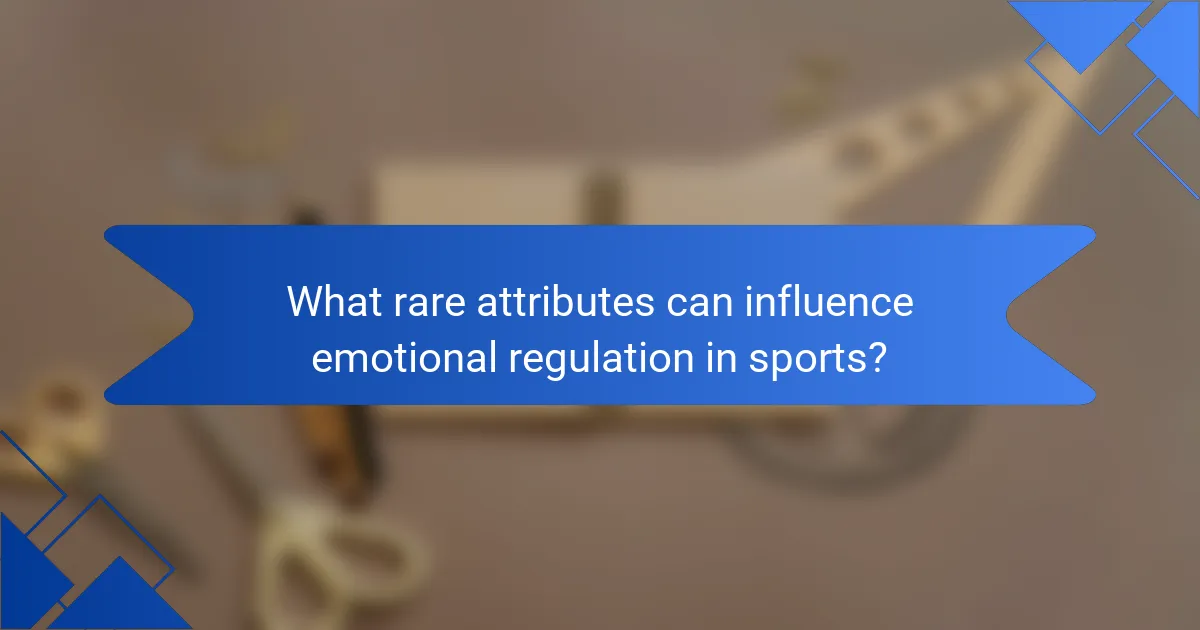
What rare attributes can influence emotional regulation in sports?
Rare attributes influencing emotional regulation in sports include individual psychological resilience, social support systems, and adaptive coping strategies. These attributes enhance athletes’ ability to manage stress and maintain focus under pressure. For instance, athletes with strong social networks often experience improved emotional stability, which positively impacts performance. Additionally, unique coping mechanisms tailored to specific sports can lead to better emotional responses during competition. Understanding these rare attributes can significantly enhance mental resilience in athletes.
How do cultural factors shape emotional responses in athletes?
Cultural factors significantly influence emotional responses in athletes by shaping their mindset and coping mechanisms. Different cultures emphasize various values, such as individualism or collectivism, which can affect how athletes experience stress and resilience. For instance, athletes from collectivist cultures may prioritize team harmony, leading to different emotional responses during competition compared to those from individualistic cultures who may focus on personal achievement. Understanding these cultural nuances can enhance mental resilience training, helping athletes manage stress more effectively and maintain focus under pressure.
What uncommon emotional regulation practices have shown success?
Uncommon emotional regulation practices that enhance sports performance include visualization techniques, mindfulness training, and biofeedback. Visualization helps athletes mentally rehearse successful outcomes, improving focus and reducing anxiety. Mindfulness training cultivates present-moment awareness, aiding in stress management and emotional balance. Biofeedback provides real-time data on physiological responses, enabling athletes to regulate emotions effectively. These practices contribute to mastering mental resilience and enhancing overall athletic performance.
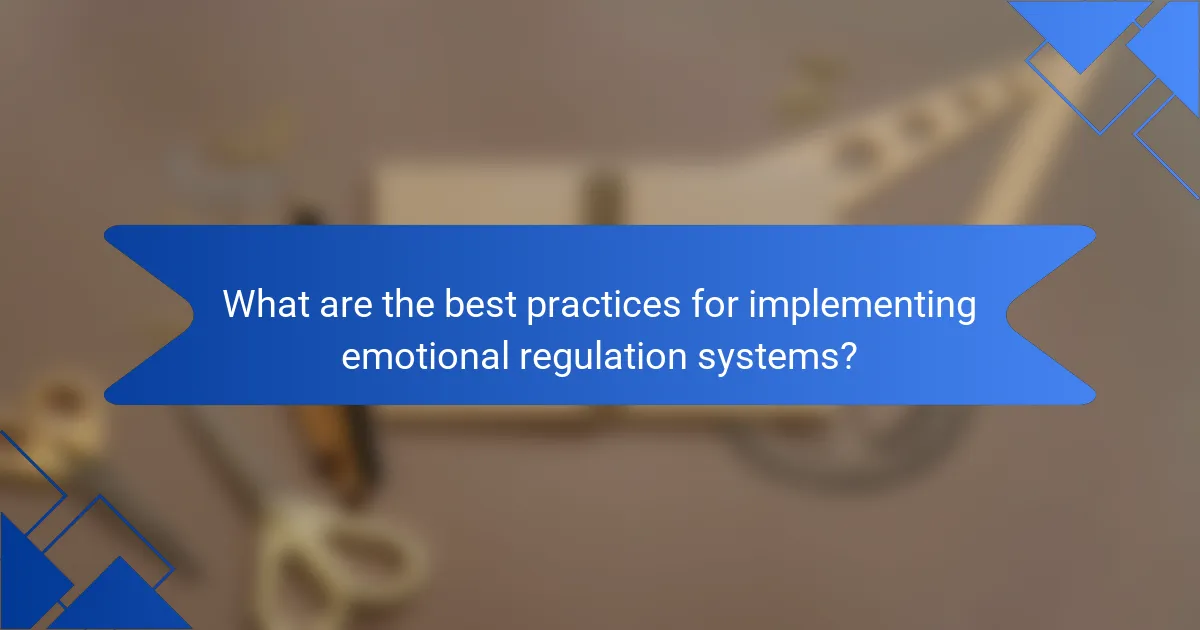
What are the best practices for implementing emotional regulation systems?
To implement emotional regulation systems effectively, athletes should prioritize self-awareness, establish routine practices, and utilize cognitive strategies. Self-awareness allows athletes to recognize emotional triggers, enhancing their ability to manage stress. Regular practices such as mindfulness or breathing exercises create a foundation for emotional stability. Cognitive strategies, including reframing negative thoughts, improve focus and resilience during competition. These best practices collectively foster a supportive environment for optimal sports performance.
How can coaches facilitate emotional regulation training?
Coaches can facilitate emotional regulation training by implementing structured strategies that enhance athletes’ mental resilience. Key methods include teaching mindfulness techniques, promoting self-awareness, and encouraging positive self-talk.
Mindfulness practices help athletes stay present and manage stress effectively. Self-awareness exercises enable athletes to recognize their emotional triggers and responses. Positive self-talk fosters a constructive mindset, improving focus and performance.
Incorporating these techniques into training sessions can lead to improved emotional regulation, ultimately enhancing overall athletic performance. Regular practice and reinforcement of these skills are essential for athletes to master emotional control during competitions.
What common mistakes do athletes make regarding emotional regulation?
Athletes often make mistakes in emotional regulation that hinder their performance. Common errors include neglecting mental preparation, failing to recognize emotional triggers, and using ineffective coping strategies.
Neglecting mental preparation leads to increased anxiety during competitions. Athletes may overlook the importance of visualization and positive self-talk. Failing to recognize emotional triggers can result in unexpected outbursts or loss of focus. Athletes may not identify stressors, such as pressure from coaches or personal expectations.
Using ineffective coping strategies, such as avoidance or denial, can exacerbate stress. Instead of addressing emotions, athletes may distract themselves, leading to unresolved issues. Developing emotional awareness and effective regulation techniques is crucial for enhancing sports performance.
How can athletes optimize their emotional regulation strategies for peak performance?
Athletes can optimize emotional regulation strategies by implementing mindfulness, cognitive restructuring, and visualization techniques. Mindfulness enhances present-moment awareness, reducing anxiety and improving focus. Cognitive restructuring helps athletes challenge negative thoughts, fostering a positive mindset. Visualization allows athletes to mentally rehearse performance scenarios, enhancing confidence and reducing stress.
